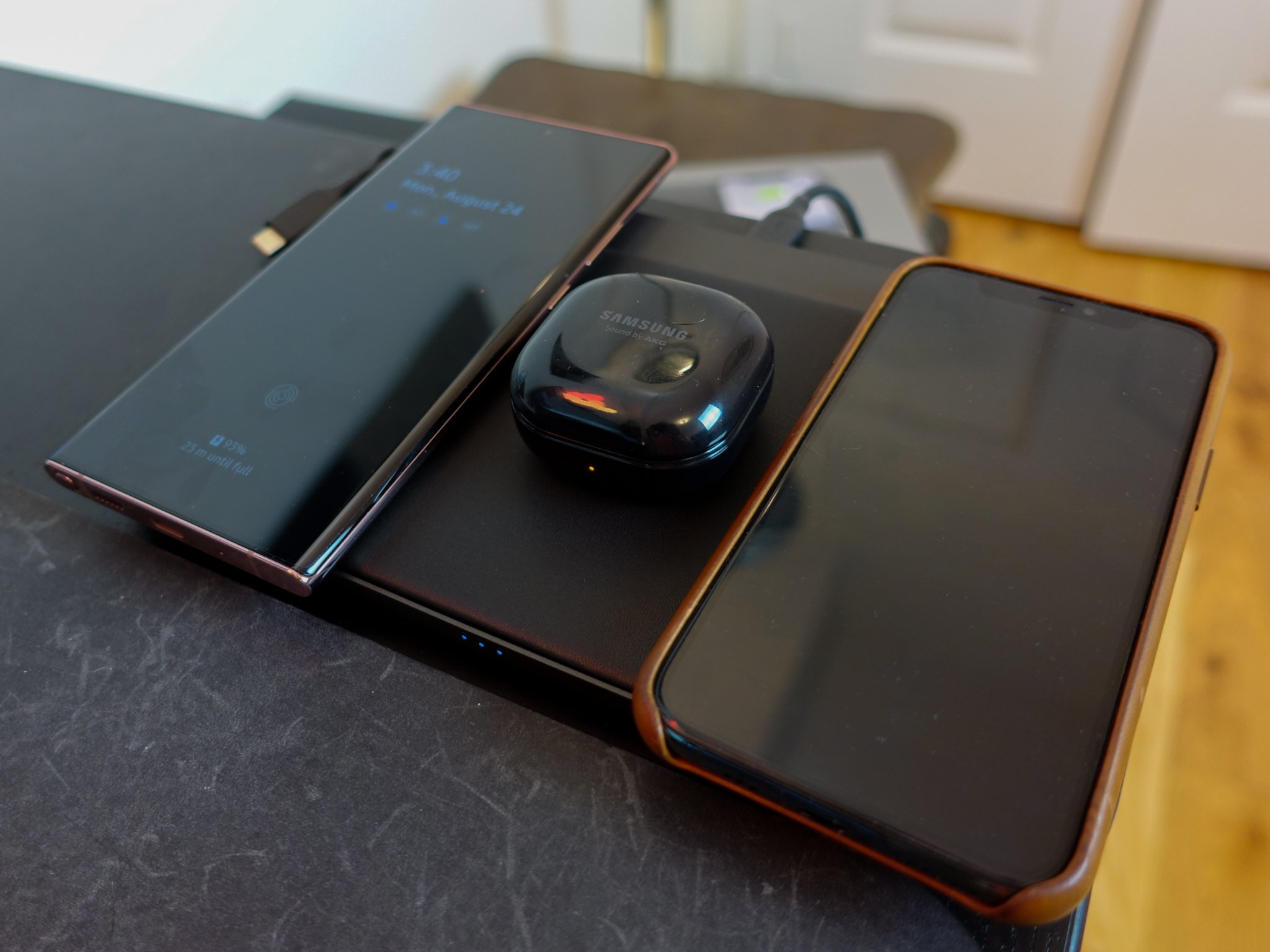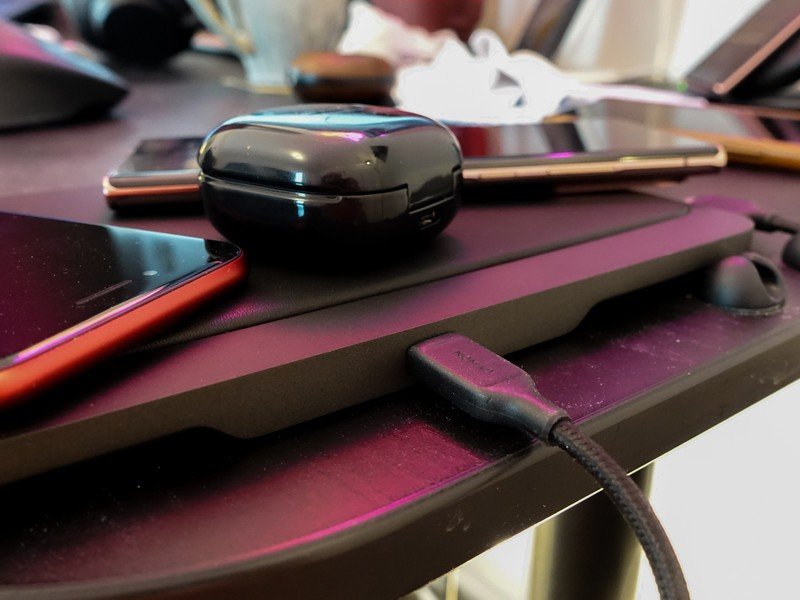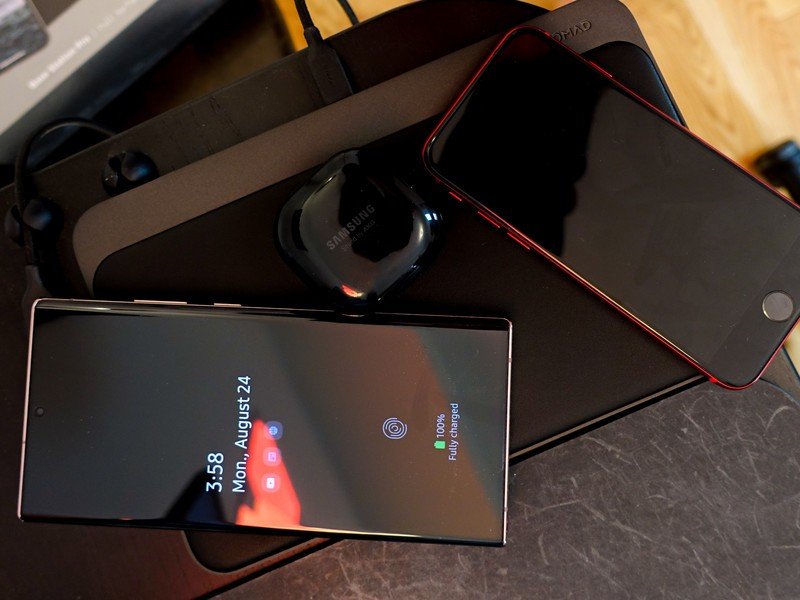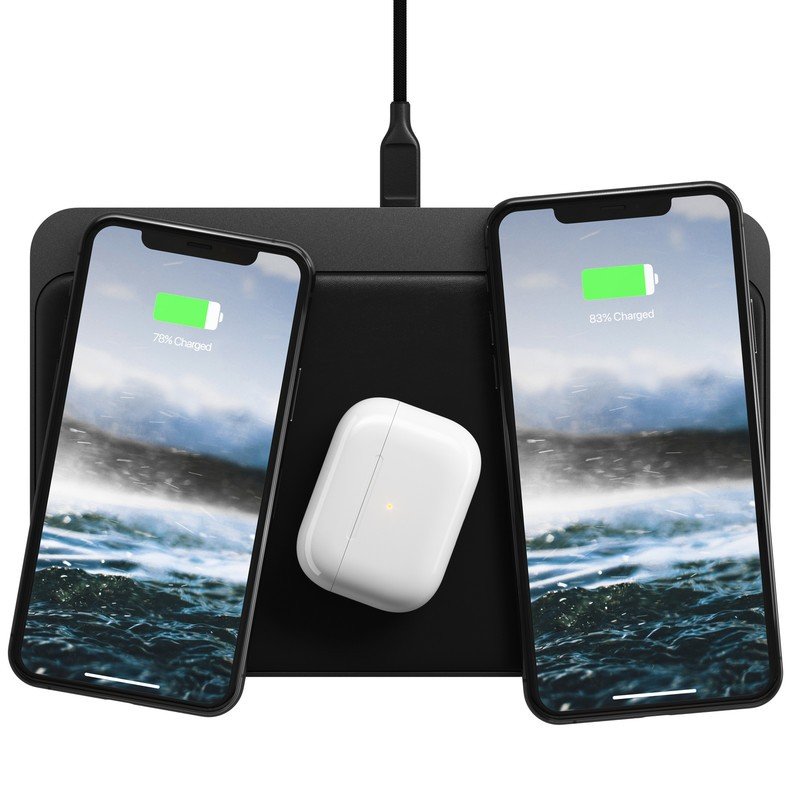Nomad's Base Station Pro is the place-anywhere wireless charger you've always dreamed of

Since the first wireless chargers debuted in the late 2000s, the next logical step has always been removing the requirement for precision placement. In plain English: you should be able to just place your phone, or your watch, or your earbuds — or all three —anywhere on a mat and just see the connection take place, coils whirring silently and efficiently underneath the surface. But that hasn't happened, despite companies as large as Apple giving it a real go.
Until now.
The Nomad Base Station Pro may look like a larger version of its elegant aluminum-and-leather dual-device Qi charger released in 2018, but it's a whole other thing altogether, the insides of which are made up of tech from Aira, a low-key startup that, despite a successful three-Shark deal back in 2019, hasn't broken through to the mainstream. One aspect of the muted messaging is built right into Aira's business model — it licenses its technology to manufacturing partners like Nomad who are better able to scale the production of a single product. The other aspect is that, until now, there hasn't been a product to actually show it off.
Launching today and shipping towards the end of September, the Base Station Pro is a $230 place-anywhere three-product Qi wireless charger, very similar in concept (if not execution, though we'll never actually know) to Apple's cancelled AirPower. The pad measures 318 square centimeters, large enough for two large phones and an accessory (Nomad uses two iPhones and a pair of AirPods Pro in its marketing material, but I tried it with a Galaxy Note 20 Ultra, a Galaxy S20+, and a pair of Galaxy Buds Live) or three smaller phones. Place these devices anywhere, in any orientation, and three lights on the charger's side light up to indicate a connection.

And, remarkably, that connection is exactly as advertised: consistent, fast, and hassle-free. It really does feel a bit like the wireless charger I've been waiting for since I first saw the Palm Pre's Touch Stone all the way back in 2009.
According to Aira's co-founder and CEO, Jake Slatnick, this process of "simplifying" a wireless charger is an extraordinarily complex process, one that took the company through many designs and prototypes. What they settled on was a mesh of hexagonal inductive charging coils, each capable of slightly overlapping one another to form a "center" and generate the proper magnetic field, with the correct power output, to seamlessly charge any Qi-compatible product that it comes in contact with. The solution is called FreePower.
The coils themselves don't resemble the ones you may have seen in phone teardowns or see-through multi-coil wireless chargers, either; they're embedded in a thin printed circuit board that communicates with a firmware-updateable chipset that dictates the Base Station Pro's choices.
Be an expert in 5 minutes
Get the latest news from Android Central, your trusted companion in the world of Android
Slatnick says that once a phone is placed on the charger and the phone's receiving coil is located and centered, the FreePower system gets to work figuring out how much current the device needs, just like any other fixed Qi charger. When another device is added, the system balances once more, ensuring that a thermal tripwire isn't cut, so to speak.

Aira reportedly worked for years to ensure that FreePower's thermal performance was in line with the Qi standard, even with multiple products being powered up at once. By using the phone's heat, as well as ambient air temperature, as guides, the FreePower system adjusts output dynamically to prevent overheating, a problem that even Apple reportedly couldn't overcome with AirPower.
So how does it all work? With a few exceptions which I'll get to shortly, remarkably well. I was successfully able to throw two large phones and a pair of earbuds, or two large phones and a third small phone, anywhere within the borders of the Base Station Pro and they all slowly chugged away, topping up over the course of a few hours.
I say slowly because Aira and its manufacturing partner, Nomad, are careful not to advertise the Base Station Pro as a high-speed wireless charger. Android devices are only capable of hitting speeds of 5 watts, while iPhones can reach a "fast charging" peak of 7.5 watts, neither of which will give recent high-speed wired charging standards a run for their money.
But Slatnick pushes back at suggestions that FreePower is considerably slower than other wireless charging solutions, saying that proprietary solutions that deviate from Qi like OPPO's 65W Super AirVOOC and Huawei's 40W Wireless SuperCharge only hit those numbers in short bursts at the beginning of a charging cycle and step down to 5W, like all wireless charging solutions, for the remainder of the top-up. "The fundamental promise of wireless charging is convenience," he says, and most solutions don't even offer that.
The Base Station Pro isn't perfect, at least not for some Android users; it currently has an issue charging Pixel-branded products, from phones to the newly-released Pixel Buds. Aira says it is working on a solution and will push out a firmware update when it's fixed (yes, this USB C-powered wireless charger can be upgraded through your computer). But so far, it's pretty damned impressive, and for many families who just want a centralized place to dump their phones and earbuds at the end of a day, the $230 price tag won't be much of an impediment.
If it is, though, Nomad promises smaller single- and dual-device versions of its FreePower wireless chargers will be coming out eventually, and Aira is already working with other companies in a variety of industries to get its place-anywhere technology into as many places as possible.
Those potential solutions range from the obvious — integrating FreePower into office desks or car consoles — to the more interesting, like hotel rooms, airplanes (remember those?) and coffee shops.
In the meantime, you'll be able to buy this product next month — and if you've ever been frustrated by wireless charging's inherent fickleness, this may be the best thing you'll spend $230 on this year.
Daniel Bader was a former Android Central Editor-in-Chief and Executive Editor for iMore and Windows Central.


